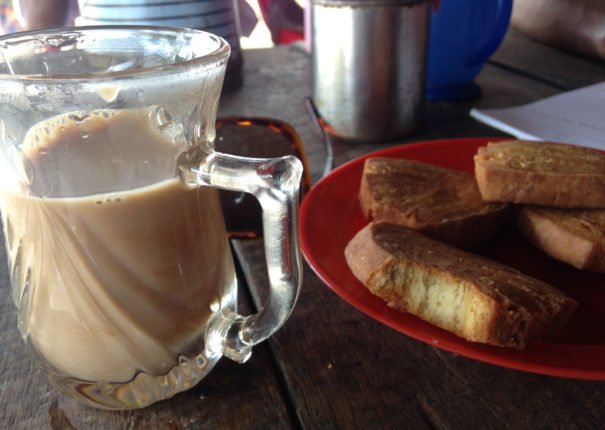
Sometimes a Biscuit Is Just a Biscuit

Sometimes a Biscuit Is Just a Biscuit
Tea and biscuits in Sittwe
Getting here is hard. I need permits upon permits, photocopied and handed out to guards like candy. I need to be brought in by a Rakhine—a member of the dominant ethnic group in this state, where sectarian tensions have been simmering for years, sometimes erupting into violence. The Rakhine fixer who brings me is a soft-spoken man whose cell phone constantly bleats an eerie rendition of the opening bars of “Hotel California.”
We enter through a military checkpoint. Then a police checkpoint. Finally, we stop. “Hotel California” starts up again. A young man slides into the car: my translator. He’s a cocky, eager kid who keeps a smartphone tucked into his longyi. He is also an IDP, an internally displaced person, who has been living here for the past four years, since deadly riots between Rakhine Buddhists and Rohingya Muslims drove more than 100,000 Rohingya from their homes and into camps they cannot leave. I ask if there’s somewhere we can go to talk about our work. He takes me to a shack. It takes a minute before I realize it’s a tea shop.
Of course. That’s where you go to talk in Myanmar: there’s a tea shop on every corner, with men in longyis hunched low over the tables, arguing or reading the newspaper or arguing over the newspaper, sipping milk-sweetened brew out of tiny mugs, chewing betel and spitting out the remains in blood-red gobs. This one isn’t much more than a tarp-lined roof held up by bamboo poles, but there are the same low tables, the same haphazard array of old posters and an out-of-tune plastic clock. The men in longyis, though, are sprawled around listlessly, free of many of the obligations of daily life but also the pleasures: making one’s own way, stealing a moment from a busy day for a cup of tea.
“Some people have work, but mostly they have no work, so they just sit,” the translator says. Those who have a few cents to spare can do their sitting here, in this shop, and watch an Indian movie on a generator-powered television. The obvious thing for us to do is also sit, and order tea. With it, unbidden, come a few dry biscuits. I am reluctant to even take a bite, but they are unexpectedly good: sweet with a salty tang, a bit nutty. The more nibbles I take, the better it tastes, and the better it seems to go with the tea, until I almost forget about the privations of the setting.
“Is this a traditional Rohingya food?” I ask.
My translator, understandably, finds my queries somewhat beside the point.
“It’s just a biscuit,” he says.